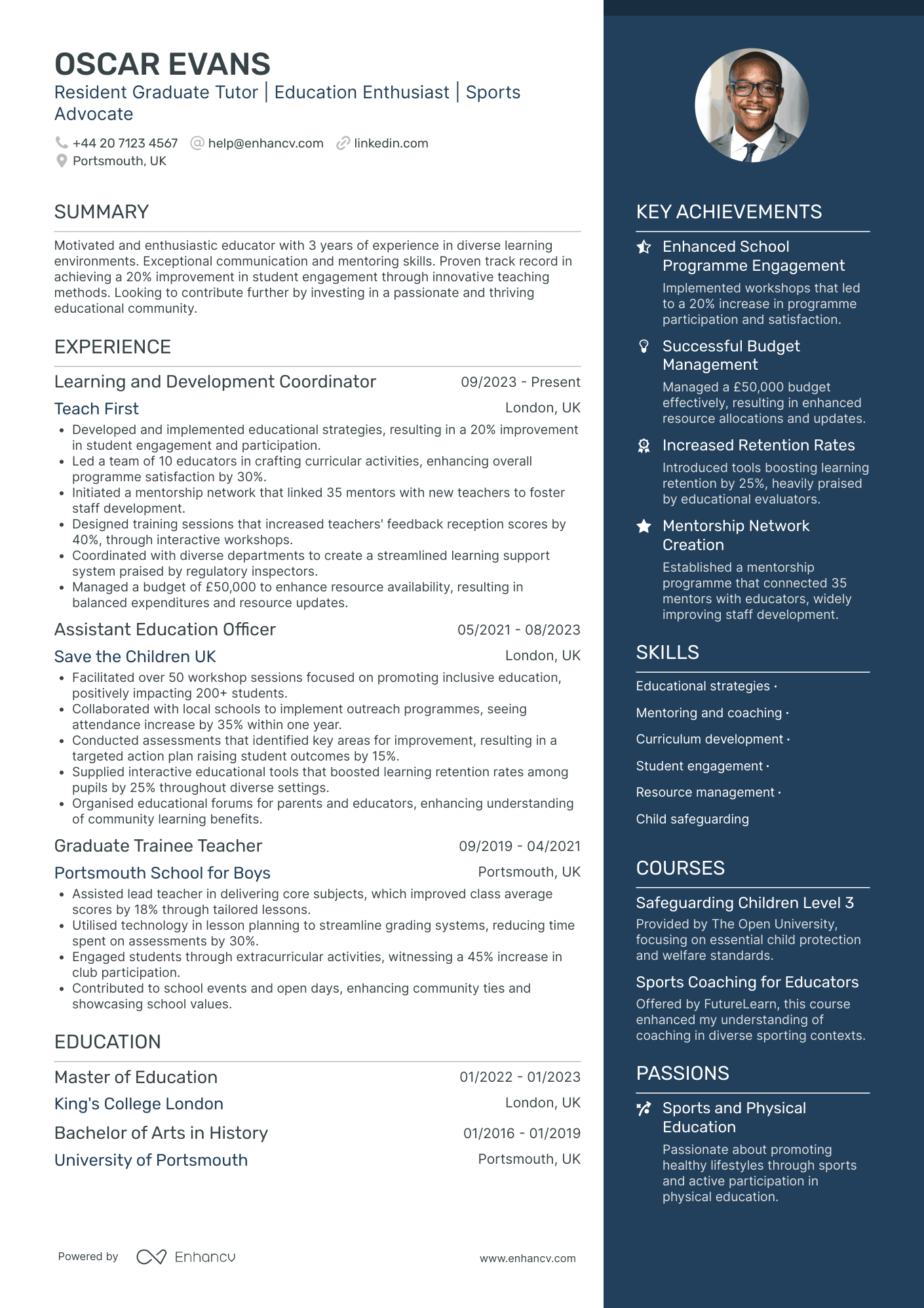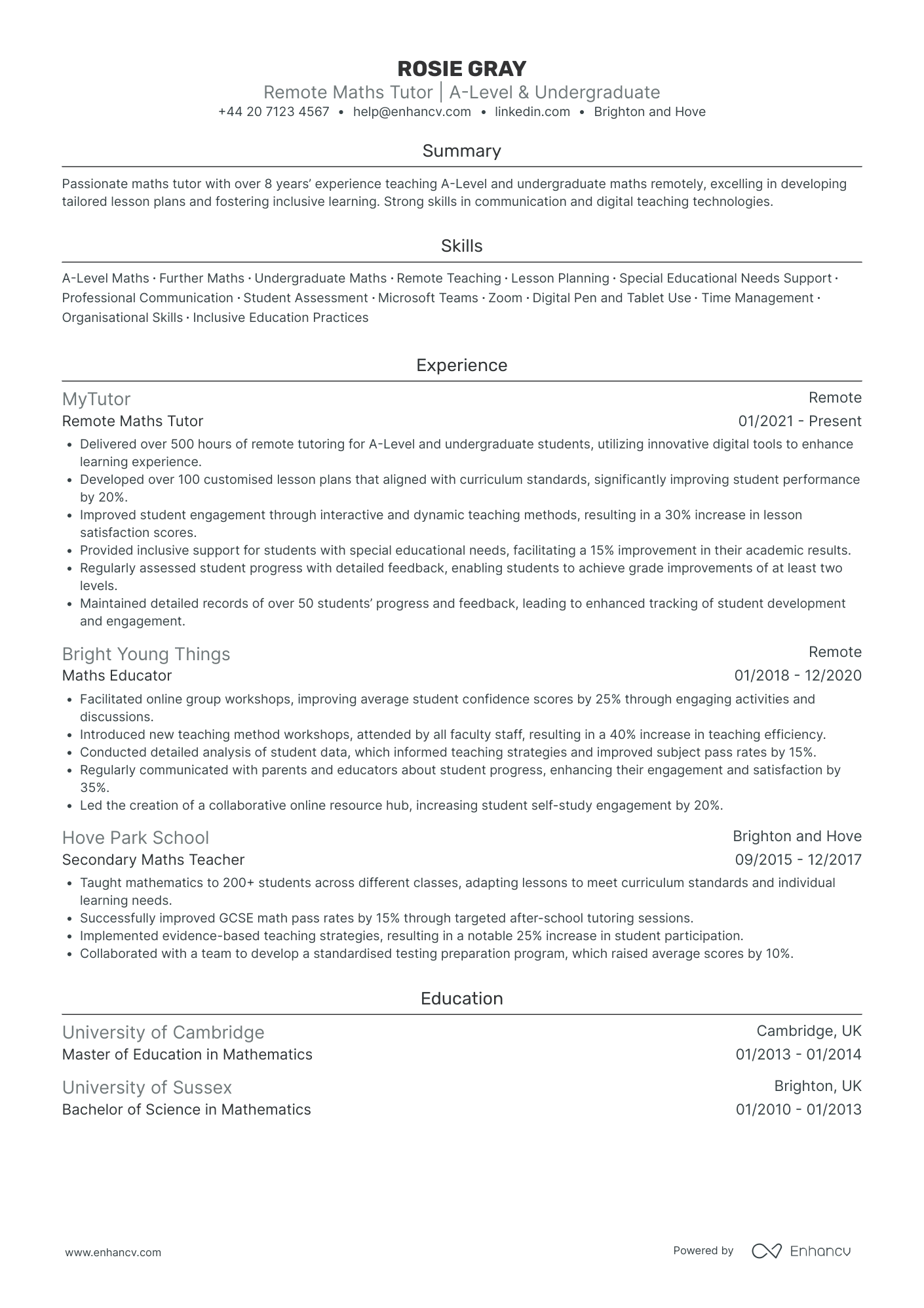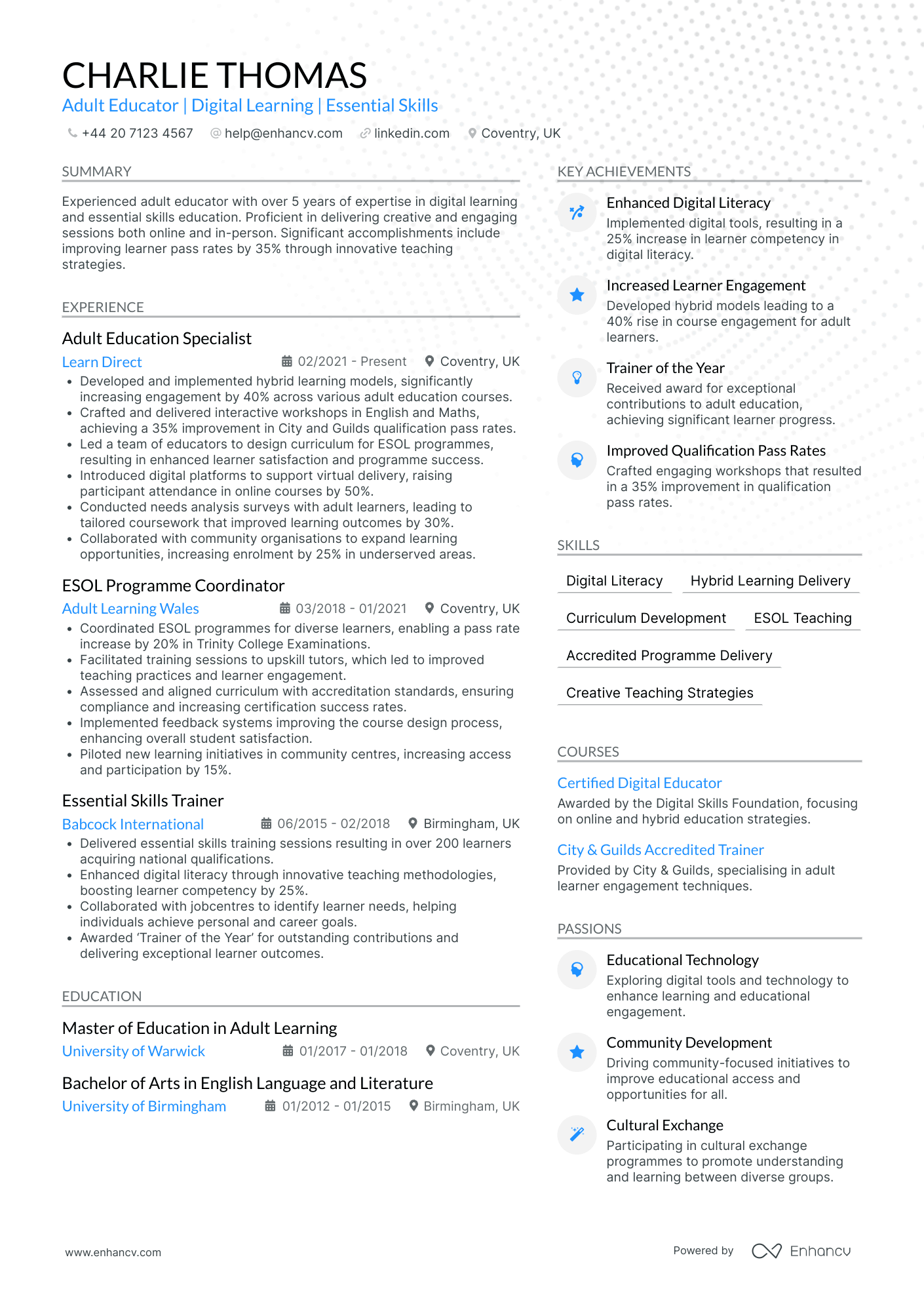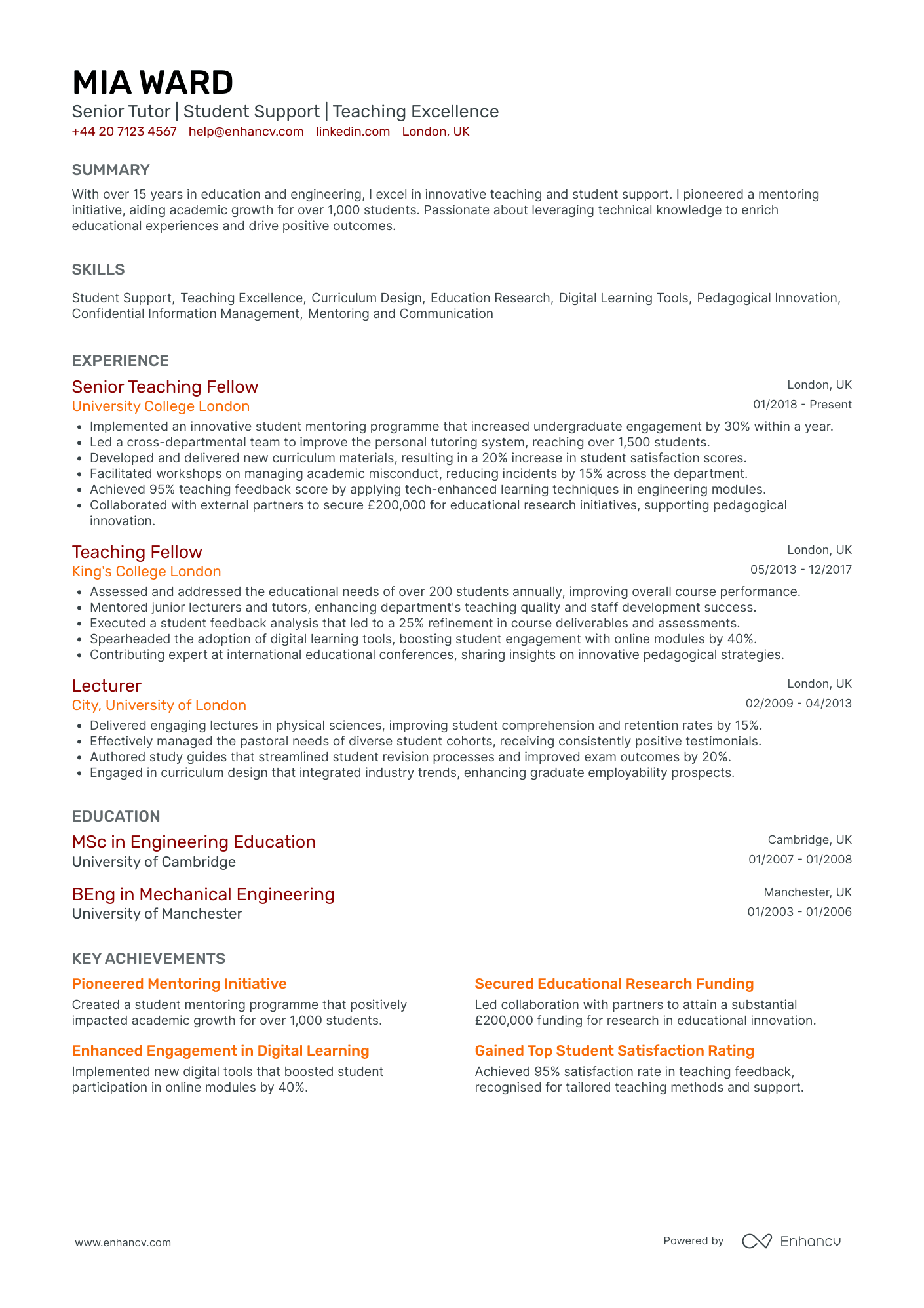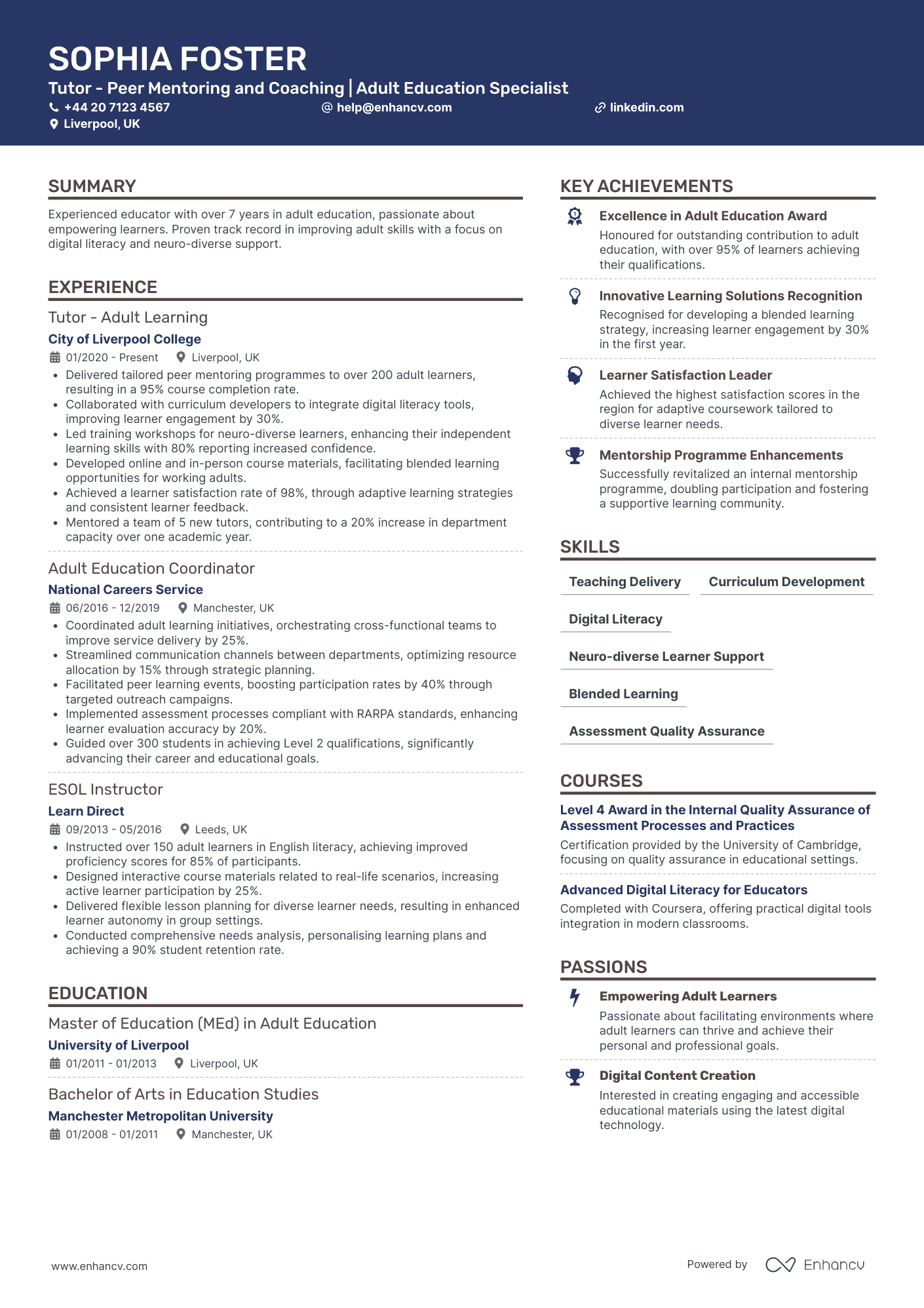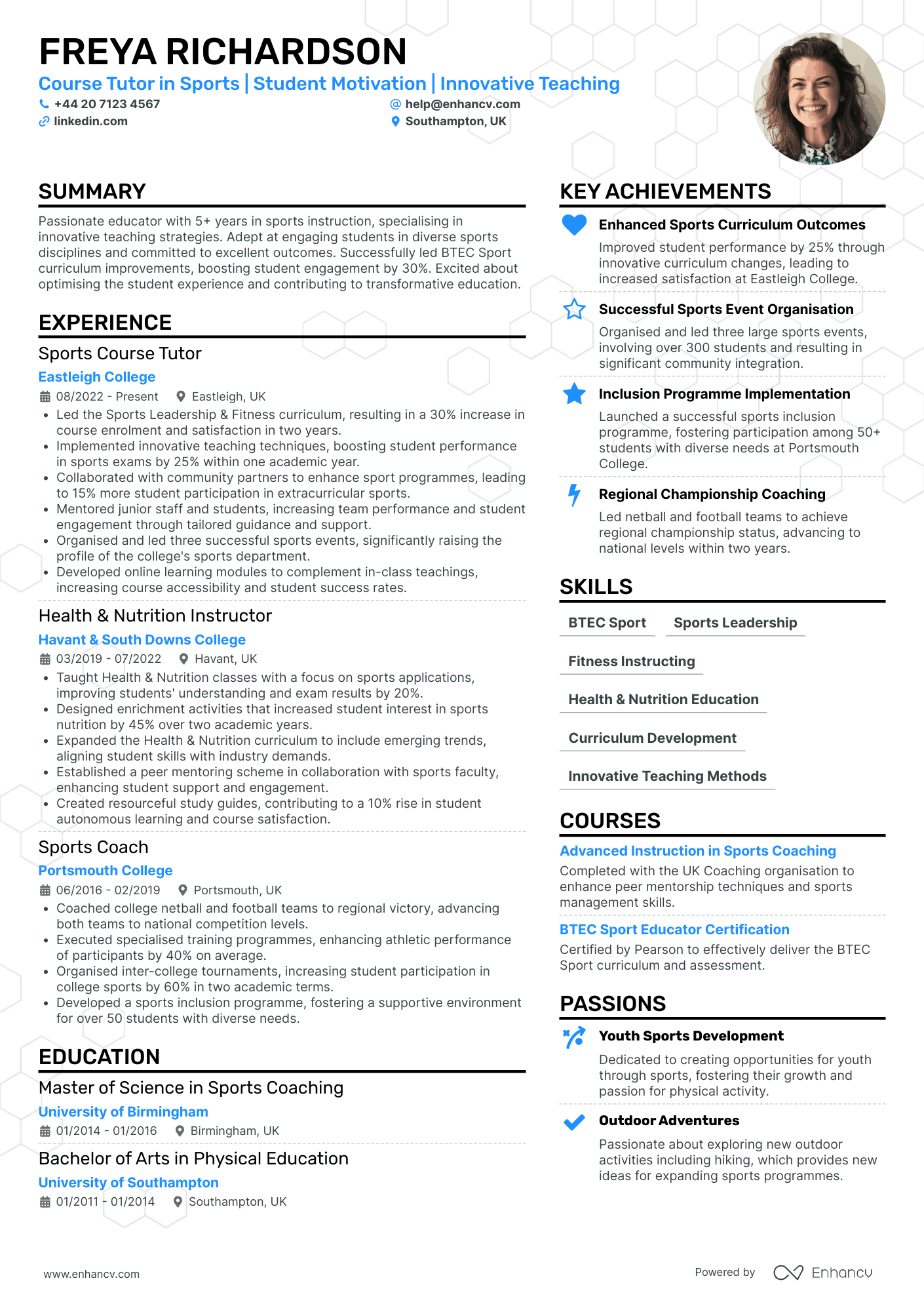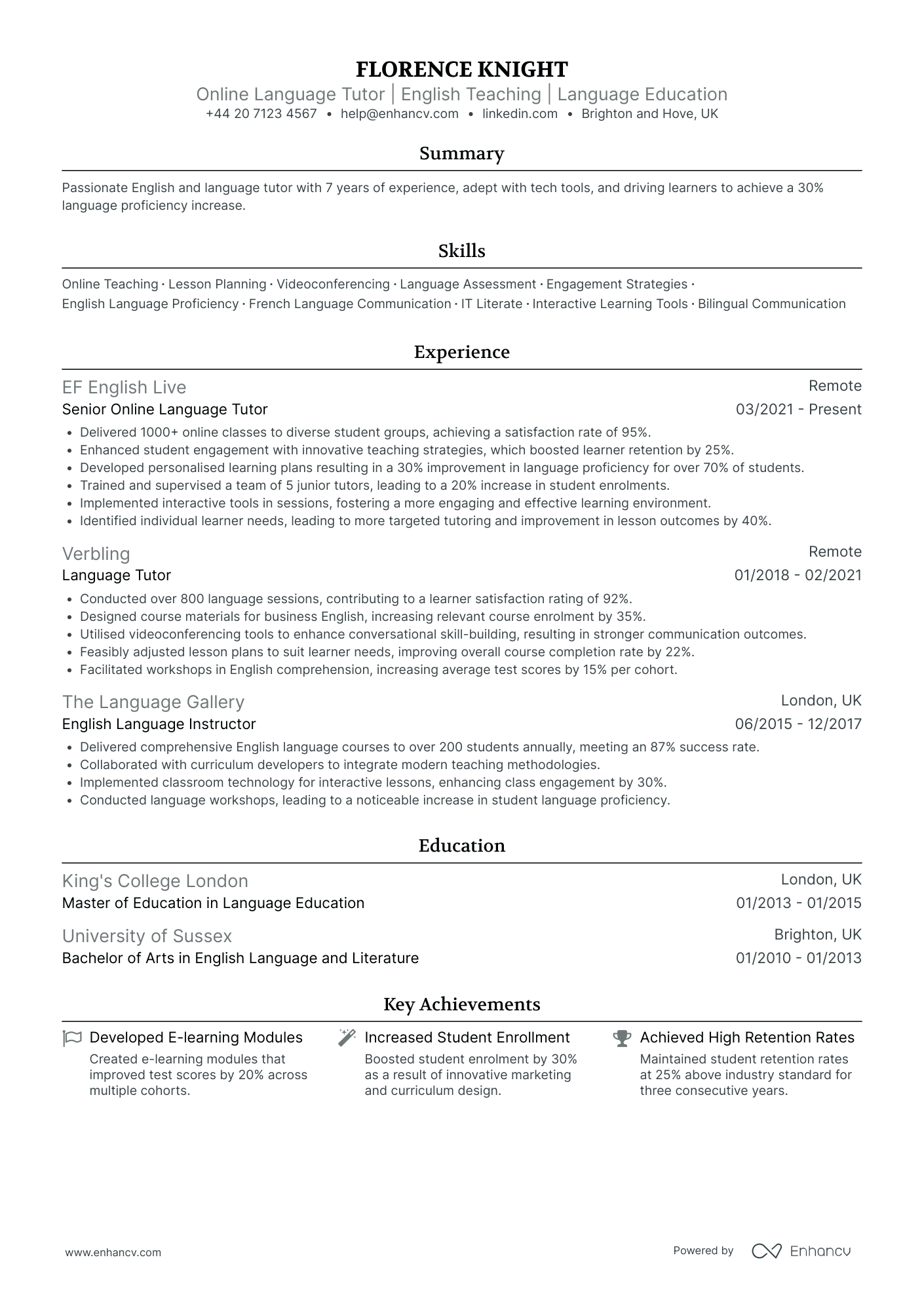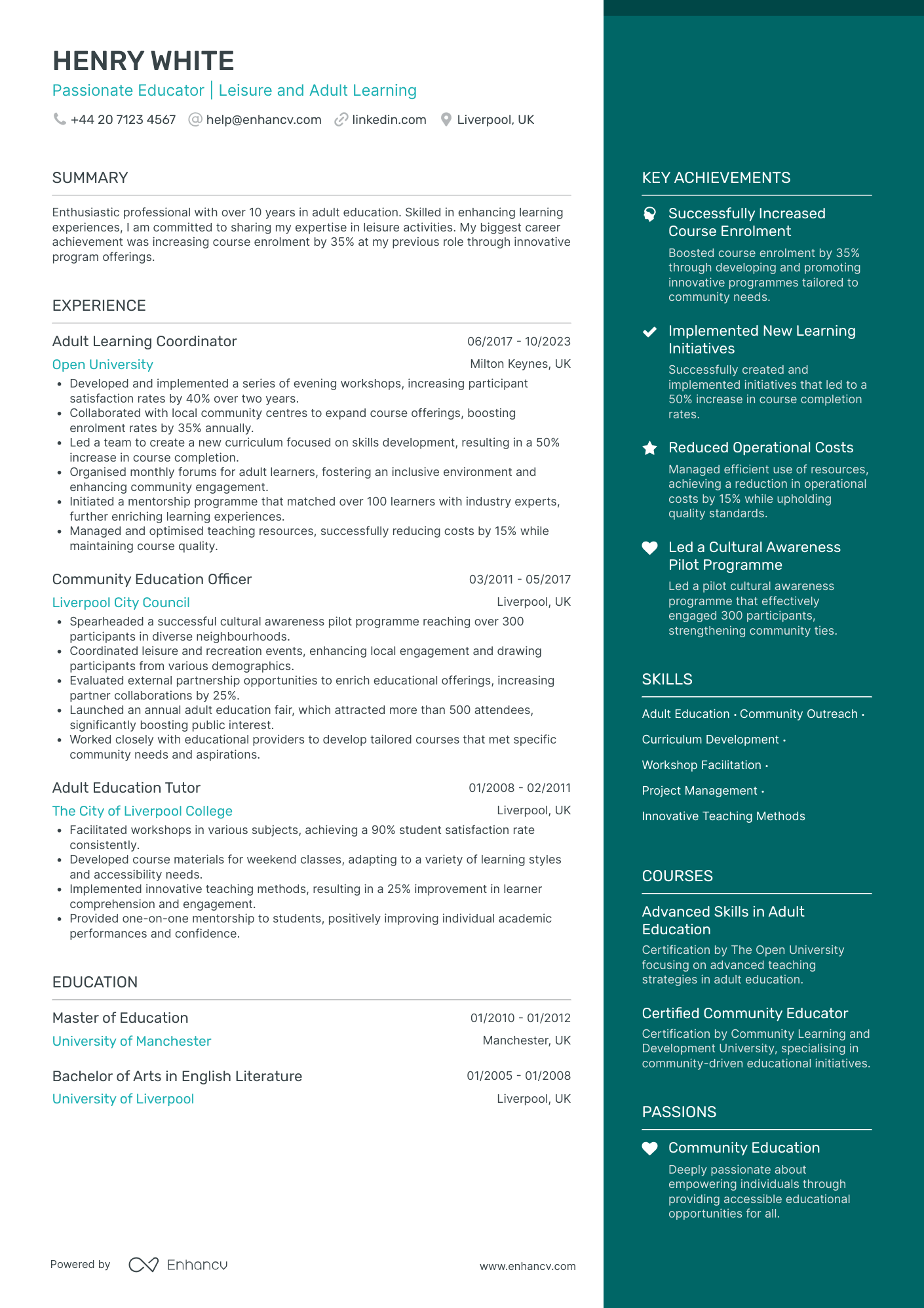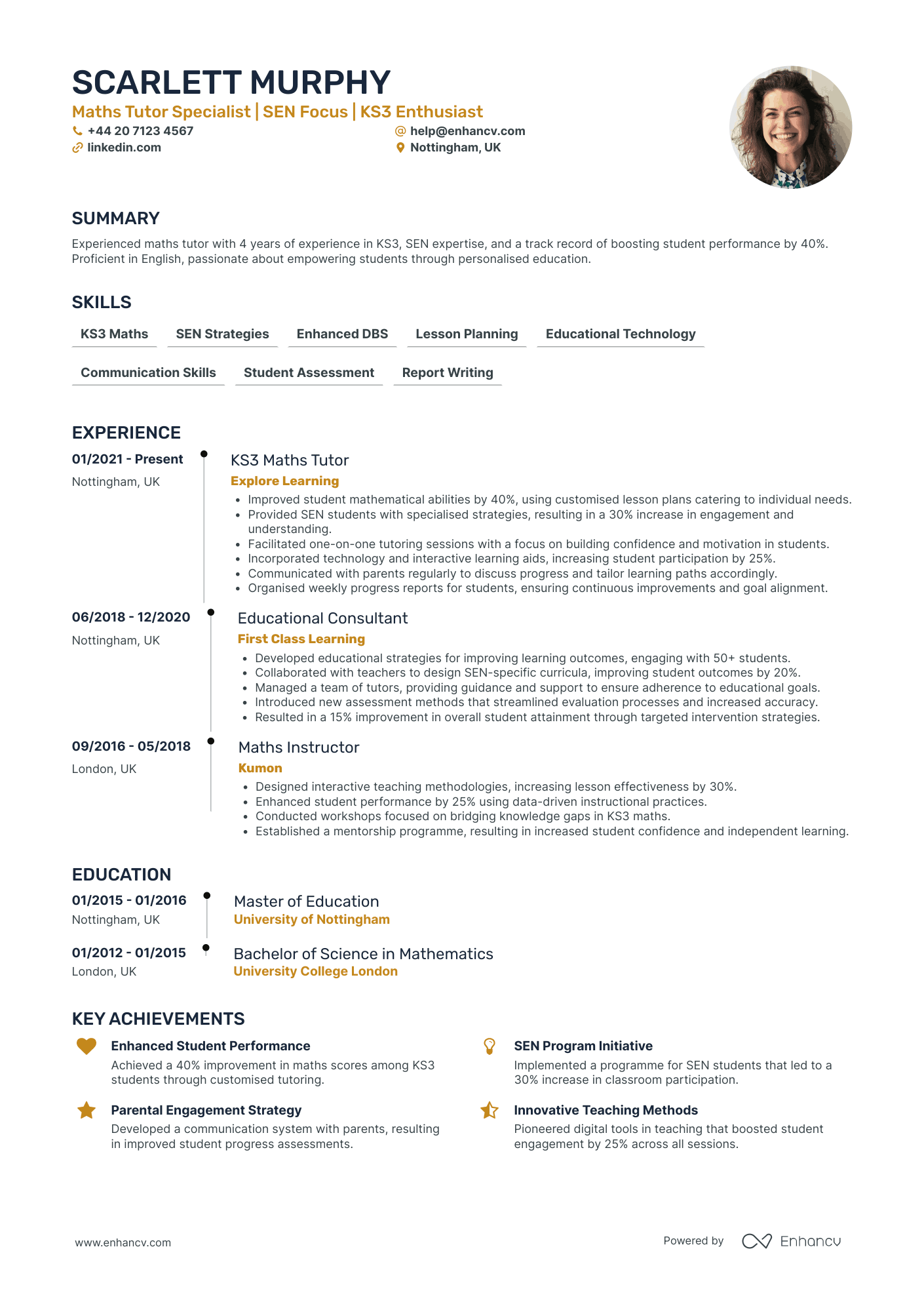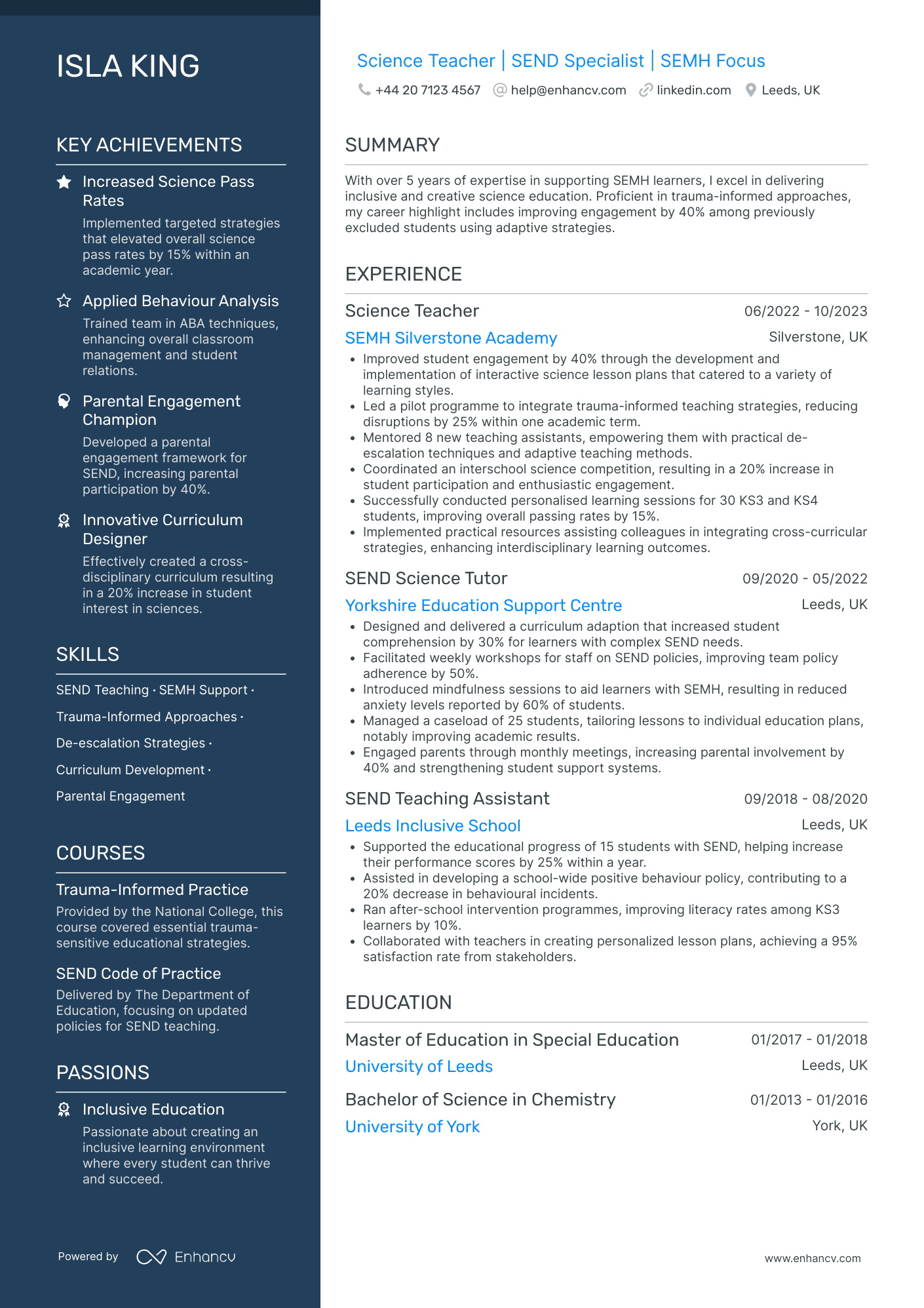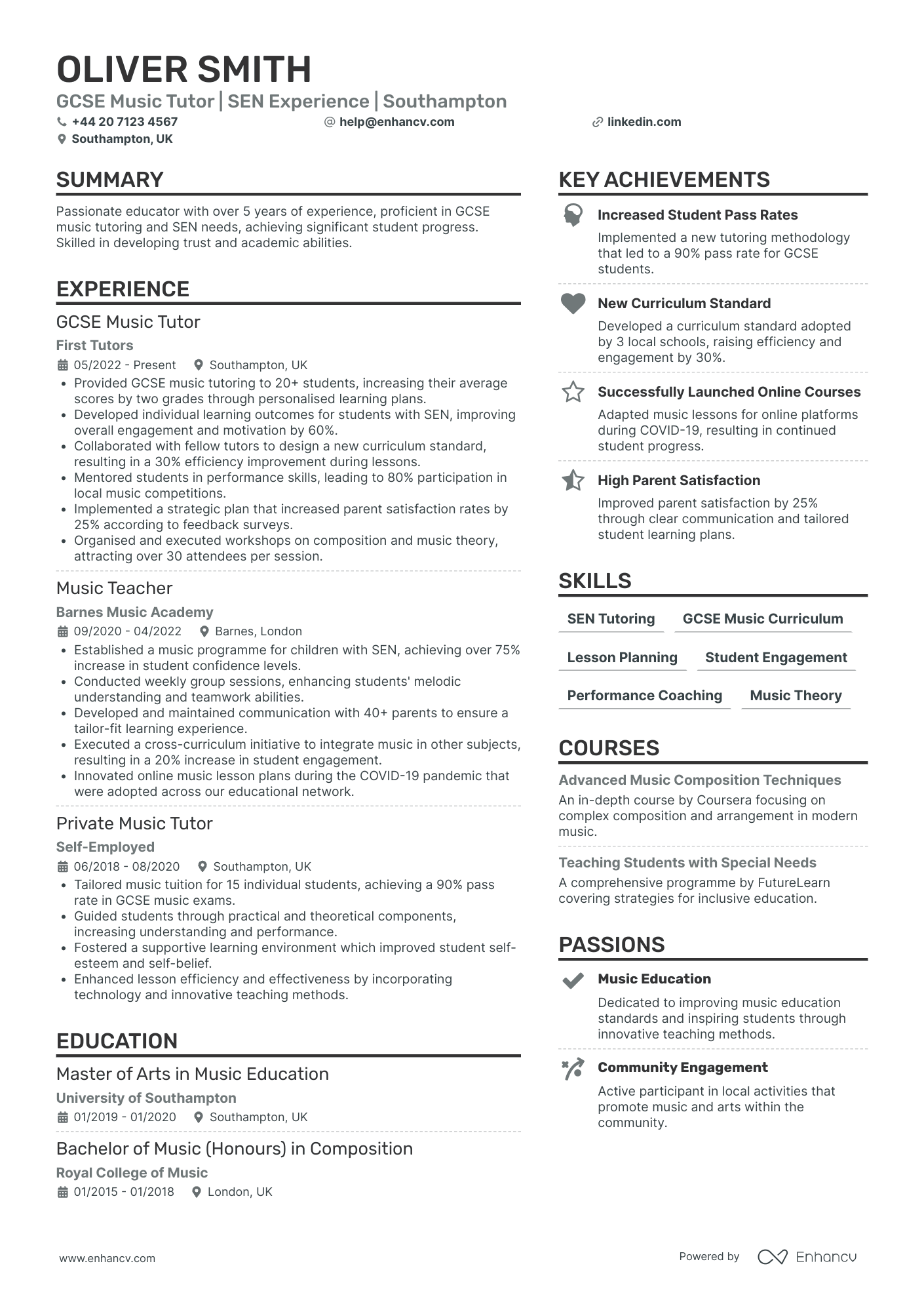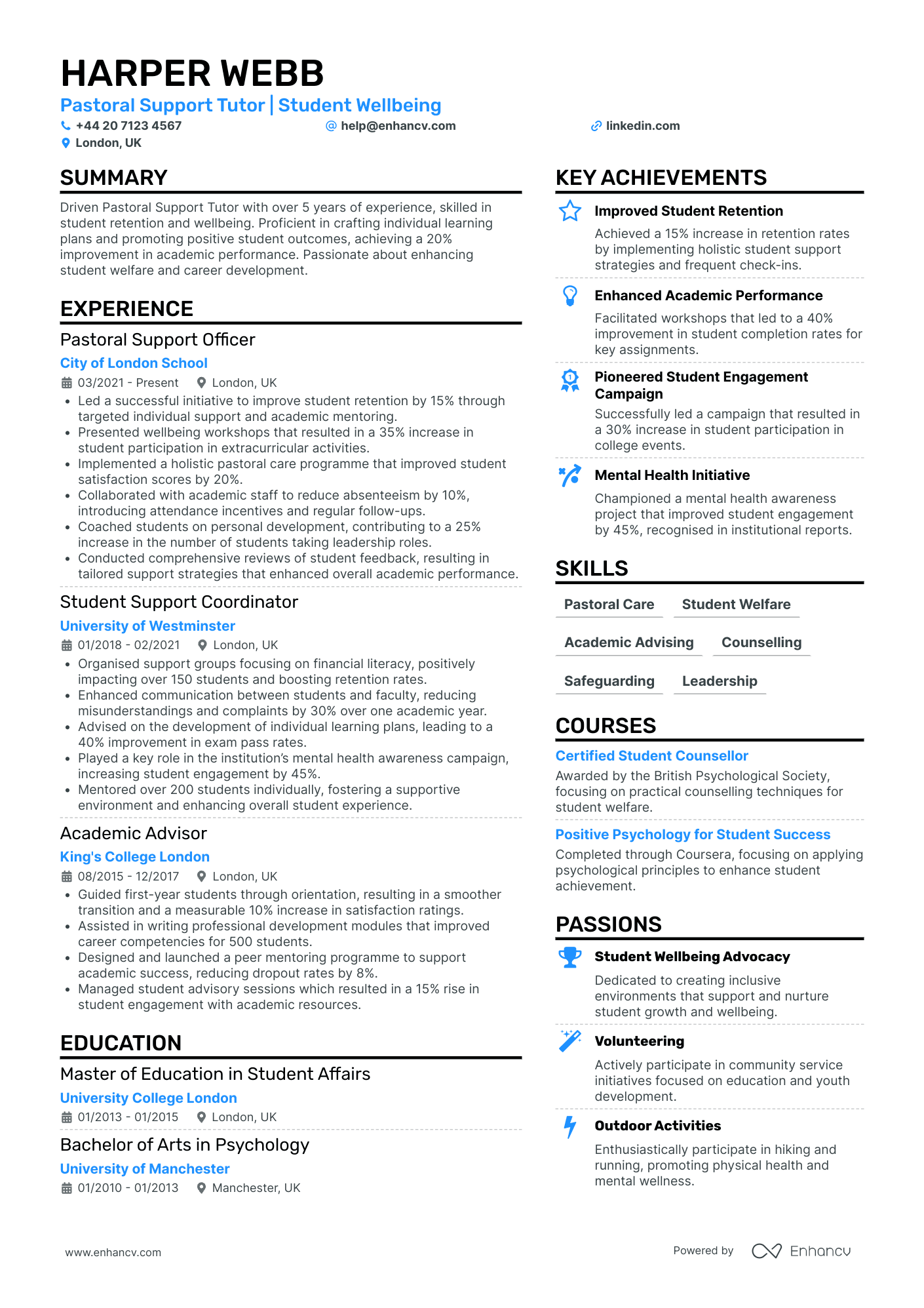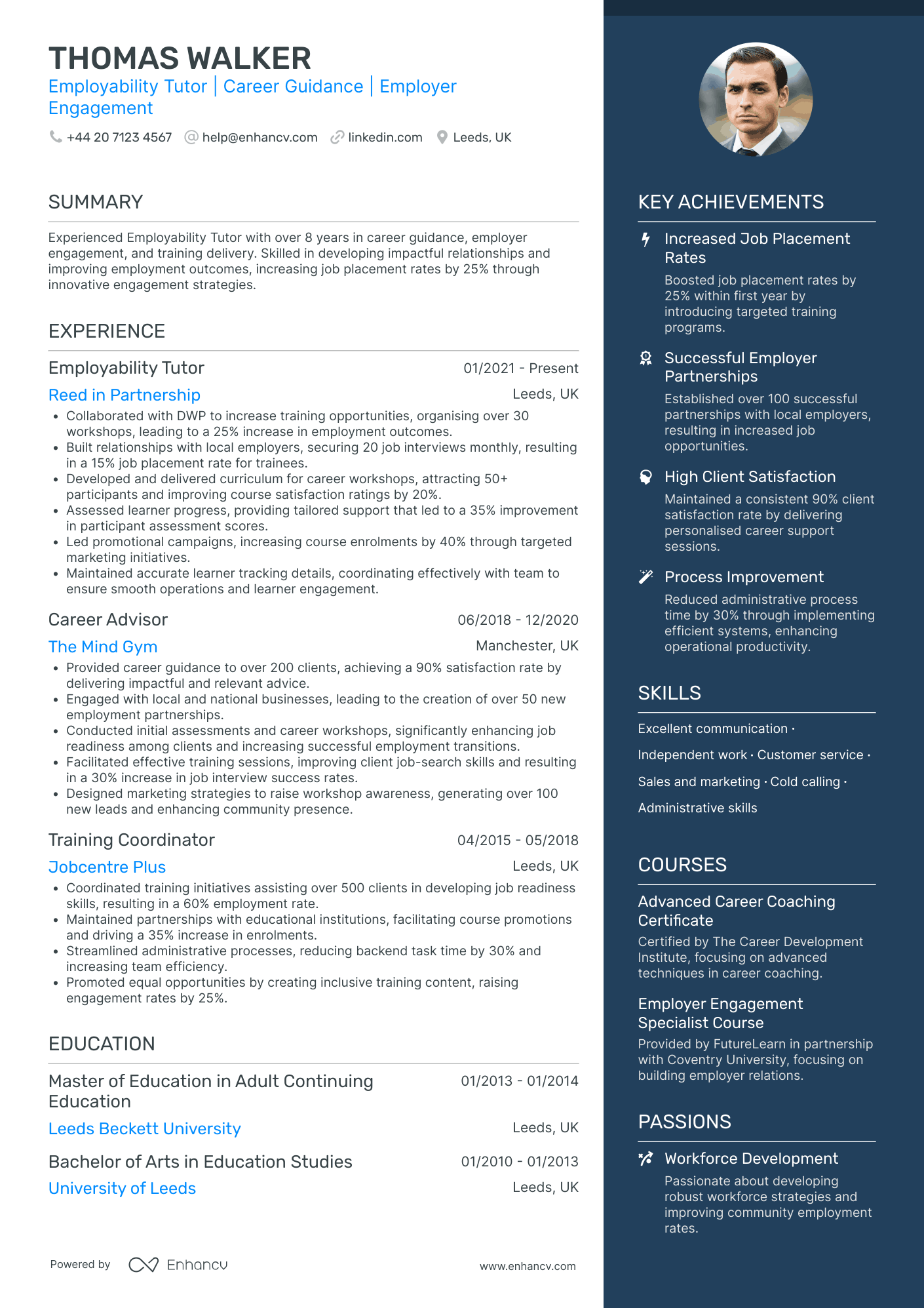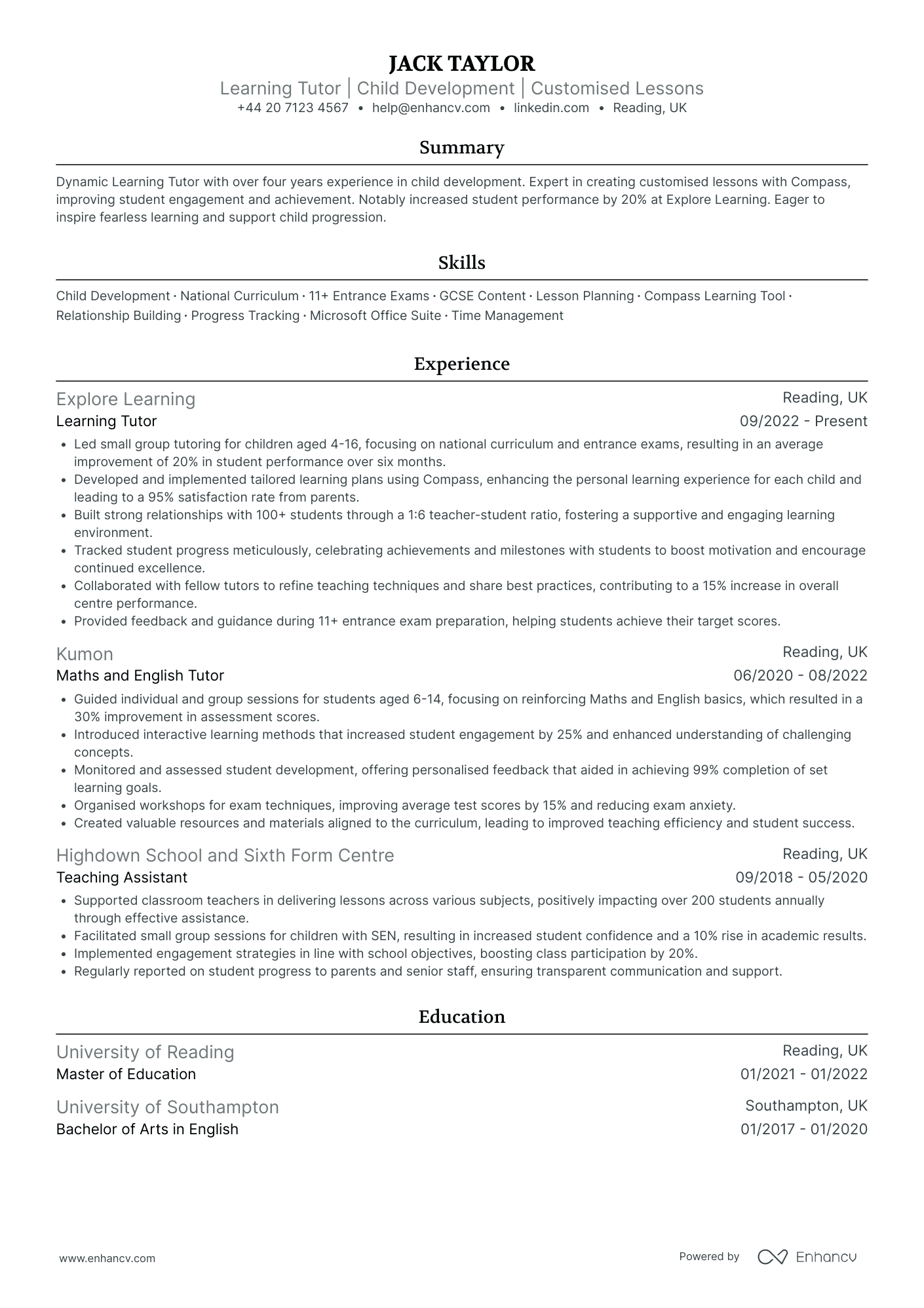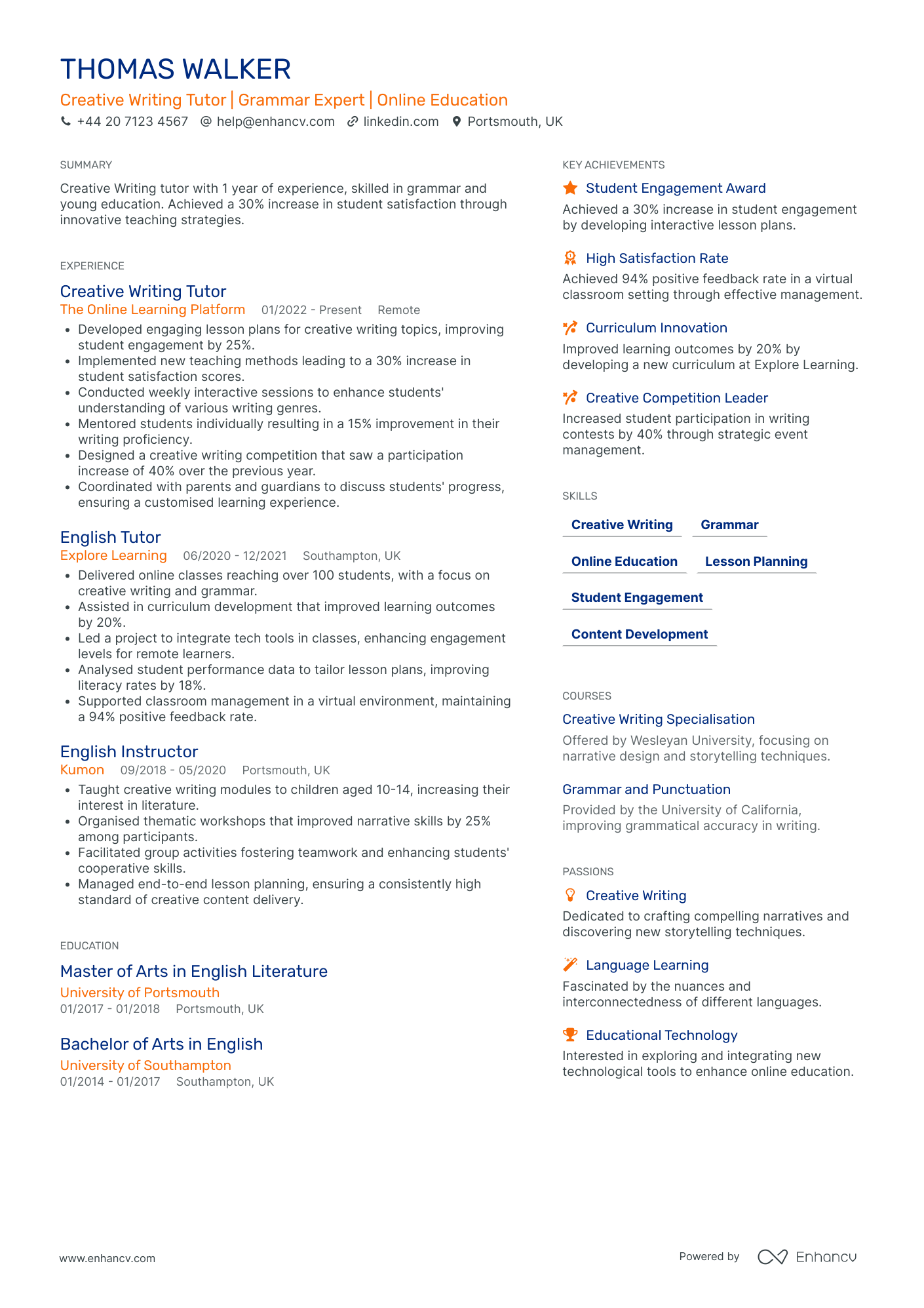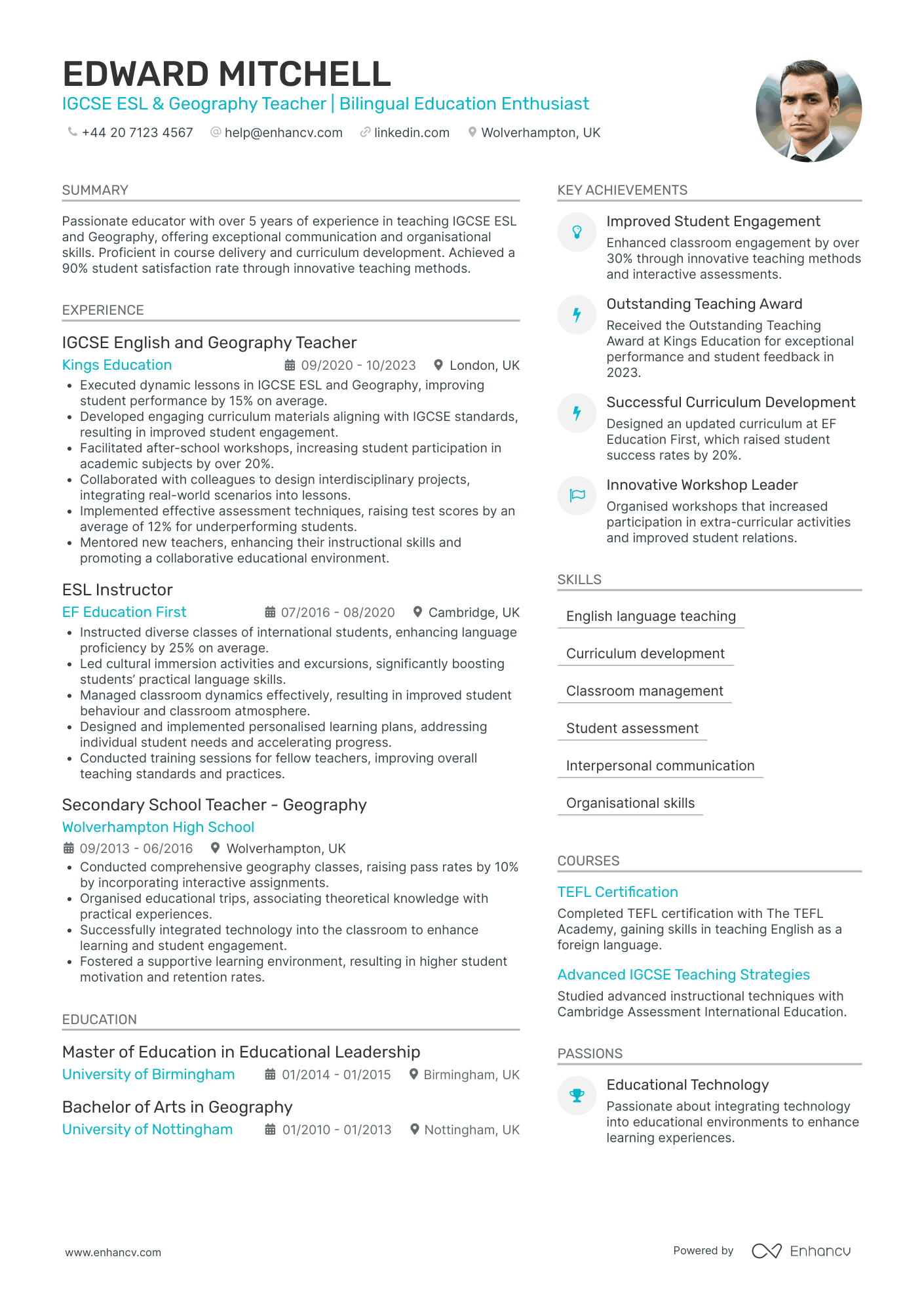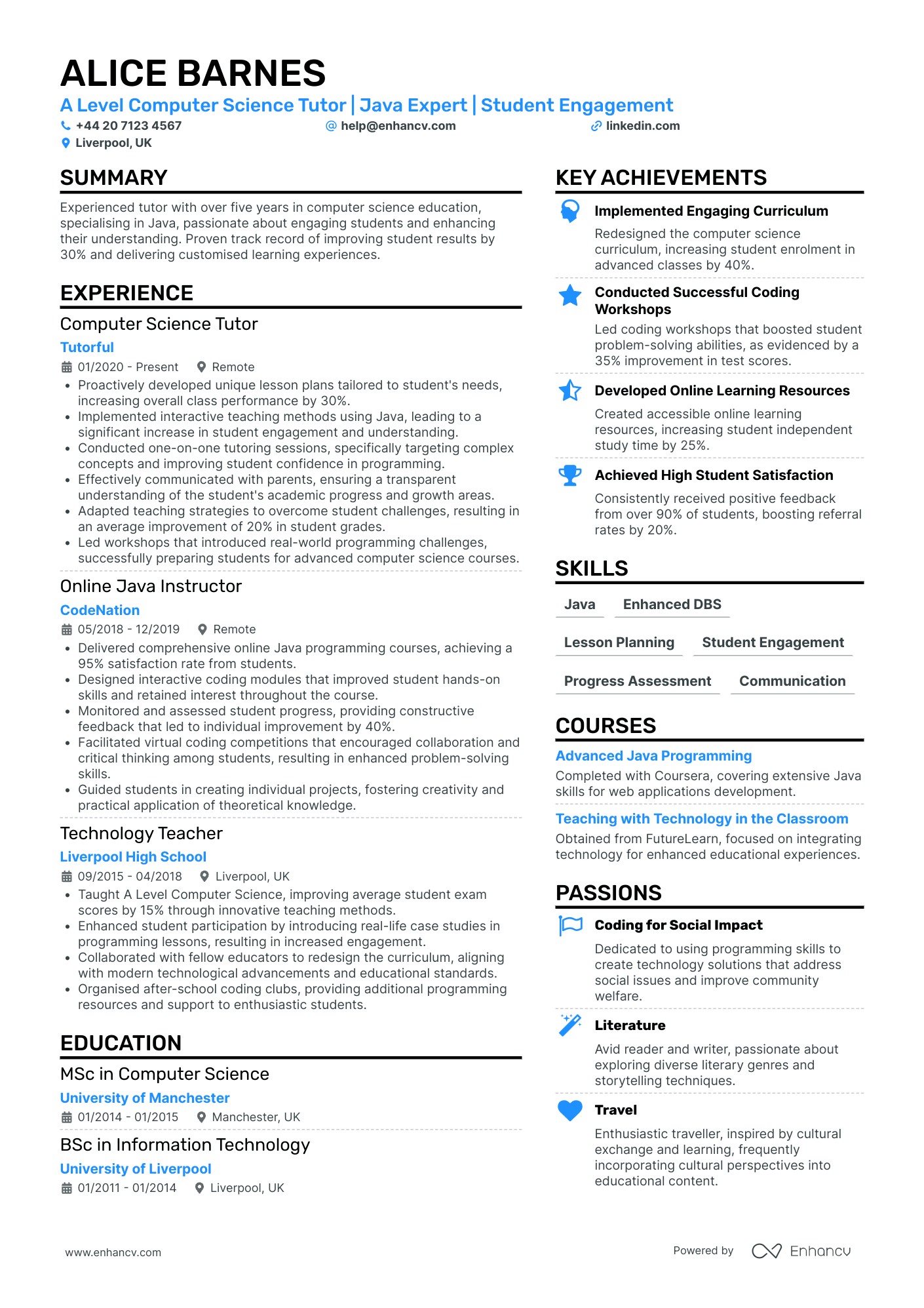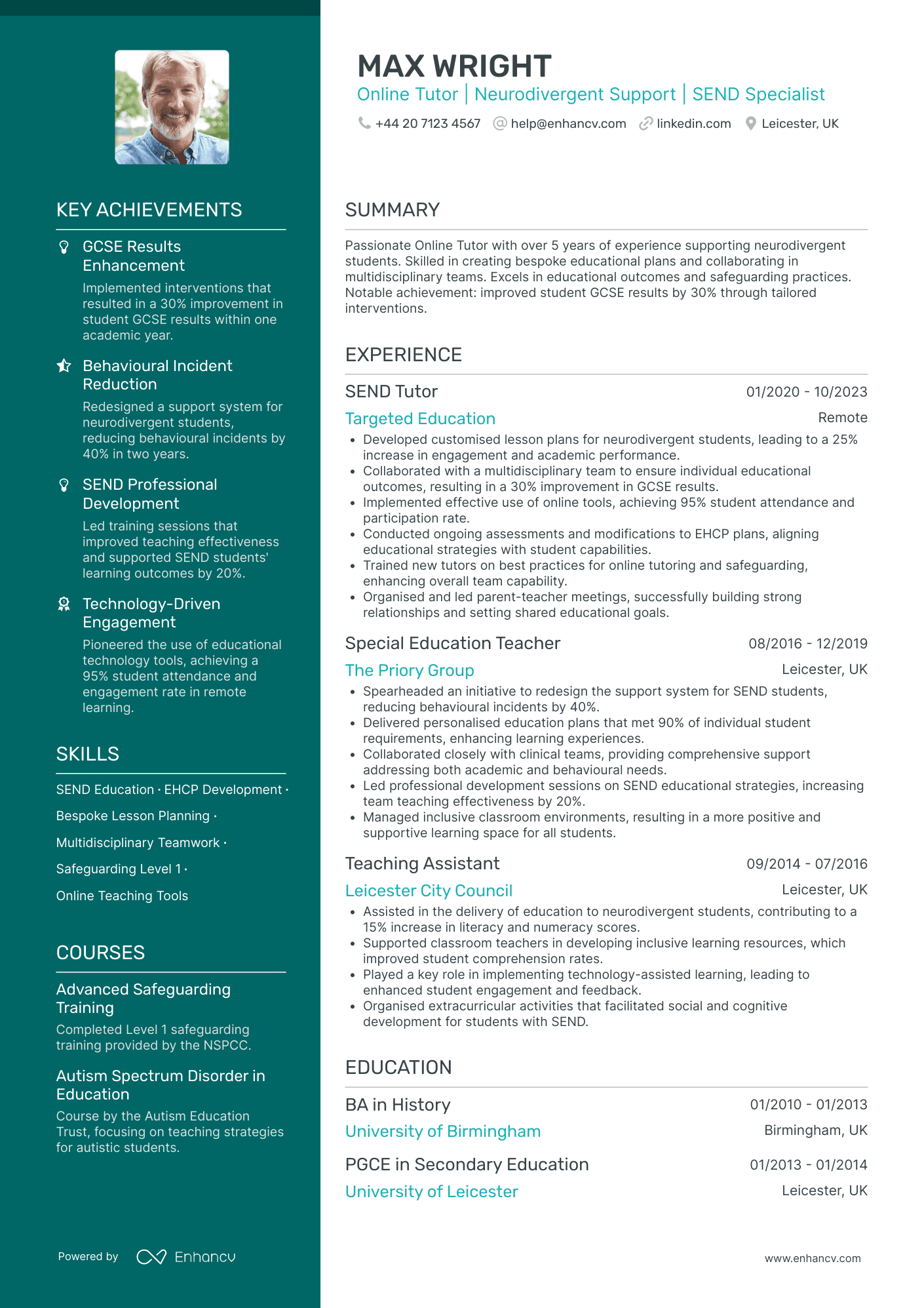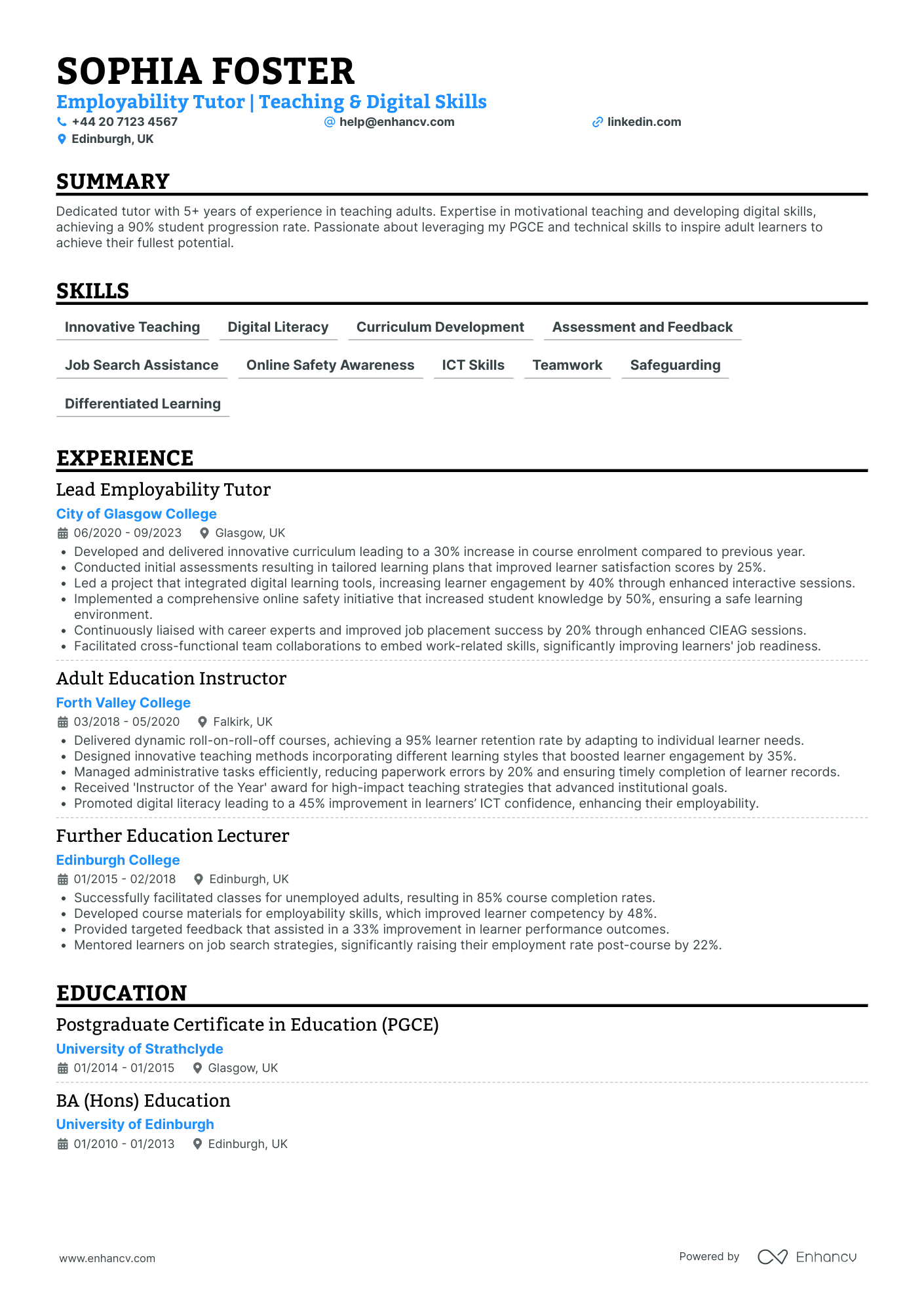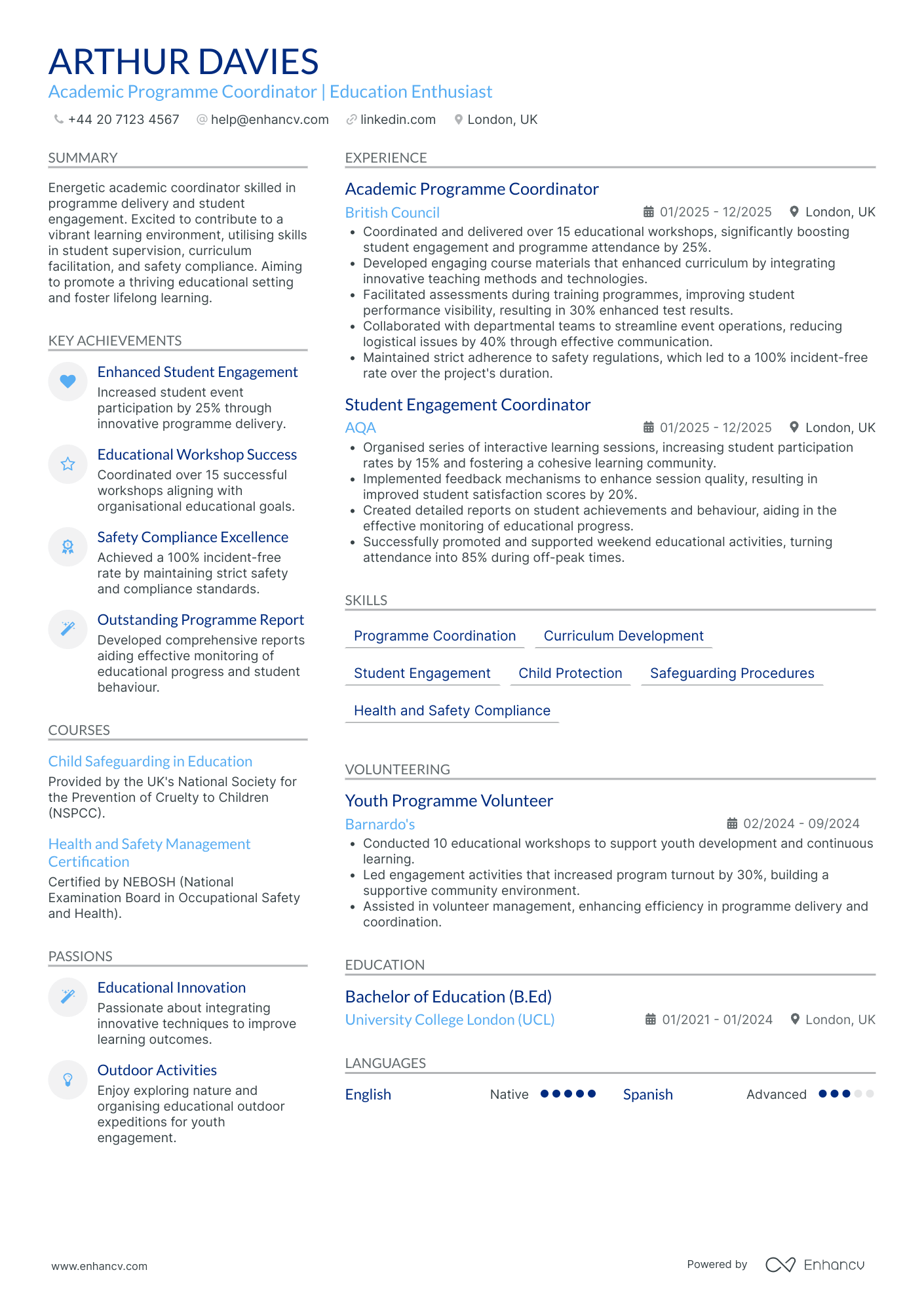One significant CV challenge you might face as a tutor is effectively showcasing the diverse set of skills and experiences you have gained through academic and one-on-one teaching settings. Our guide is designed to illuminate the process of articulating your pedagogical competencies and tailoring your portfolio to resonate with potential employers in the education sector.
- Design and format your professional tutor CV;
- Curate your key contact information, skills, and achievements throughout your CV sections;
- Ensure your profile stays competitive by studying other industry-leading tutor CVs;
- Create a great CV even if you happen to have less professional experience, or switching fields.
When writing your tutor CV, you may need plenty of insights from hiring managers. We have prepared industry-leading advice in the form of our relevant CV guides.
CV examples for tutor
By Experience
Graduate Tutor
- Effective use of quantifiable achievements - The CV excels in demonstrating Oscar's impact through specific numeric metrics. From a 20% improvement in student engagement to a 35% increase in programme attendance, these figures provide clear evidence of his effectiveness in educational settings, making the content more persuasive.
- Career trajectory highlights upward mobility and specialization - Oscar's career path shows structured growth, shifting from a Graduate Trainee Teacher to a Learning and Development Coordinator over just a few years. This progression suggests increasing responsibility and expertise, particularly in education management and mentoring roles.
- Showcases robust cross-functional collaboration - The CV portrays Oscar as someone with significant adaptability and cross-functional experience, demonstrated through his ability to manage diverse departments, lead educational forums, and implement outreach programs. This experience would be highly beneficial for roles requiring coordination across multiple stakeholders.
Undergraduate Tutor
- Structured Presentation for Ease of Understanding - The CV is meticulously organized into sections such as Experience, Education, Skills, and Achievements, making it easy for potential employers to quickly identify relevant information. The structured format aids in maintaining clarity and conciseness, ensuring that each part of the candidate's professional journey is accessible and straightforward to interpret.
- Demonstrates Strong Career Growth and Industry Expertise - Rosie Gray's career trajectory shows a clear growth path, from a Secondary Maths Teacher to a Remote Maths Tutor specializing in A-Level and Undergraduate instruction. This progression highlights her expanding expertise in remote education and adaptation to technological advancements in teaching, underscoring her commitment to professional development in maths education.
- Emphasizes Innovation and Technological Integration in Education - The CV outlines Rosie's adept use of digital tools such as Microsoft Teams, Zoom, and digital pen and tablets, showcasing her capability to integrate technology into her teaching methodologies. This technological proficiency not only enhances learning experiences but also aligns with modern educational trends, proving her to be forward-thinking and industry-relevant.
Entry-Level Tutor
- Logical and Clear Presentation - The CV is well-organized, guiding the reader through an understandable narrative of Charlie Thomas's career. Key sections such as experience, education, and achievements are clearly delineated, making the information easy to digest. The bullet points are concise and targeted, ensuring that each accomplishment stands out without overwhelming the reader.
- Progressive Career Development - The career trajectory of Charlie Thomas shows a consistent upward growth in the adult education sector. Starting as an Essential Skills Trainer and moving to the position of ESOL Programme Coordinator and then to Adult Education Specialist, each role represents a step up in responsibility and expertise. This progression showcases their ability to take on greater challenges and achieve more significant impact over time.
- Adaptation of Modern Educational Methods - The integration of hybrid learning models and digital platforms underscores Charlie Thomas's commitment to innovative teaching methods. By utilizing these tools to boost engagement and learning outcomes, the CV demonstrates familiarity with cutting-edge educational trends and technology, setting them apart in a competitive field.
Senior Tutor
- Emphasizes quantitative impact in mentorship and learning - This CV highlights the candidate's capability to drive significant improvements in student engagement and satisfaction, underscored by a pioneering mentoring programme that boosted undergraduate engagement by 30% and designing curriculum enhancements that lifted satisfaction scores by 20%.
- Illustrates a progressive career in academia - Mia Ward’s career trajectory reflects a steady progression towards increasing responsibility and impact in the educational sector, moving from a Lecturer role to a Senior Teaching Fellow at prestigious institutions like University College London. It highlights continuing influence and contribution to student and instructional advancement over the years.
- Integrates technology with academic instruction - The CV showcases Mia’s adeptness in utilizing digital learning tools to enhance education delivery. By spearheading the adoption of online modules and driving a 40% uptick in digital engagement, Mia demonstrates innovative use of technology in traditional academic settings, indicative of a forward-thinking educator.
Peer Tutor
- Concise and Structured Presentation - The CV effectively organizes content with clear sections, ensuring ease of navigation for readers. Each section is concise, focusing on key elements such as experience, education, and skills, enabling a quick overview of Sophia's qualifications and career history.
- Steady Career Development in Adult Education - Sophia’s career trajectory reflects a consistent focus on adult education, with roles advancing from ESOL Instructor to Tutor and Adult Education Coordinator. This progression demonstrates her growing expertise, leadership skills, and her dedication to empowering adult learners through various educational programs.
- Outstanding Achievements with Quantifiable Impact - The CV highlights significant accomplishments, such as a 95% course completion rate at the City of Liverpool College and a 30% increase in learner engagement. Such achievements emphasize Sophia's ability not only to deliver educational programs but also to drive meaningful improvements in student outcomes and institutional capacity.
By Role
Private Academic Tutor
- Clarity and Structured Presentation - The CV is neatly organized, featuring clearly defined sections such as experience, education, skills, courses, achievements, languages, and passions. Each section provides concise yet detailed insights into specific aspects of Freya’s professional journey, making it easy for hiring managers to quickly grasp her qualifications.
- Strong Career Trajectory in Education and Sports - Freya's career path showcases a progressive trajectory, moving from a Sports Coach to a Course Tutor, which highlights her growing expertise and leadership in sports education. Her role advancement reflects her sustained success and ability to adapt and contribute meaningfully in increasingly responsible positions in the sports instruction domain.
- Innovative Teaching and Curriculum Development - The CV emphasizes Freya's commitment to modernizing sports education through innovative teaching methods and curriculum improvements. This includes implementing new strategies that have resulted in notable increases in student engagement and performance, which indicates her forward-thinking approach and ability to lead educational innovations.
Online Language Tutor
- Logical and Well-Ordered Structure - The CV is organized in a clear and concise manner, with distinct sections for education, experience, and skills that make it easy to navigate. Each job entry within the experience section follows a consistent format, detailing position, company, location, dates, and key responsibilities, which provides clarity and emphasizes relevant achievements.
- Demonstrates Consistent Career Growth - Florence's career trajectory reflects a steady progression from an English Language Instructor to a Senior Online Language Tutor. This growth is evident in increasingly complex responsibilities, such as supervising other tutors and developing personalized learning plans, showcasing her increasing leadership and expertise in language education.
- Emphasis on Technological Adaptation - The CV highlights Florence's proficiency with a variety of technological tools, such as videoconferencing and interactive learning platforms. These skills are crucial in the realm of online language education and demonstrate her ability to adapt and innovate within the digital teaching space.
Special Education Tutor
- Clear Structure and Logical Flow - The CV is presented with a logical structure and clear headings, allowing easy navigation through Henry White's professional experiences and achievements. Each section is clearly delineated, starting from a concise summary and smoothly transitioning through career history, education, skills, courses, and achievements, painting a full picture of the candidate's career path and capabilities.
- Steady Career Growth in Education Sector - Henry White's career trajectory showcases a consistent and focused growth within the field of adult education and community learning. Progressing from an Adult Education Tutor to an Adult Learning Coordinator, Henry has taken on increasing responsibilities and leadership roles, displaying a dedication to advancing in his chosen field and expanding his influence over educational strategies and frameworks.
- Impactful Achievements with Community Relevance - The CV highlights significant achievements that extend beyond quantitative metrics, emphasizing their broader impact within the community. Innovations like the cultural awareness pilot and the mentorship program not only improved enrollment and course completion rates but also fostered community ties and broadened educational access, reinforcing their relevance to community-driven educational roles.
Mathematics Tutor
- Clear and Structured Presentation - The CV is well-organized, with each section clearly delineated and easy to navigate. The consistent structure facilitates quick assimilation of key details, particularly the chronological arrangement of experience and education that allows for immediate comprehension of Scarlett's career trajectory.
- Evident Career Growth in Education - Scarlett’s professional journey shows a clear upward trajectory, beginning with hands-on instructional roles and progressing to specialized positions that highlight her expertise in SEN (Special Educational Needs). This growth is emphasized by her movement from a Maths Instructor to an Educational Consultant, demonstrating increased responsibilities and influence in educational program development.
- Specialization in SEN and Use of Technology - The CV highlights Scarlett’s deep commitment to specialized educational needs, with consistent achievements in improving student engagement and outcomes. Her use of technology to pioneer digital tools and interactive learning approaches underscores her innovative methodologies within the industry, setting her apart from her peers.
Science Tutor
- Clear and Structured Presentation - The CV's format exhibits a logical flow with clearly defined sections such as experience, education, skills, and achievements. Each section is concise, making it easy for potential employers to quickly identify key qualifications and accomplishments pertinent to the roles in special education and science teaching.
- Progressive Career Trajectory - Isla King demonstrates significant career growth, starting as a SEND Teaching Assistant and advancing to a Science Teacher with a focus on SEMH. This progression underscores her growing expertise and leadership in the field, as she moves from supporting roles to spearheading educational initiatives and mentoring peers.
- Innovative Teaching Methodologies - The CV highlights Isla's adept use of trauma-informed and creative teaching methods, specifically tailored for students with Special Educational Needs and Disabilities (SEND) and Social, Emotional, and Mental Health (SEMH) challenges. This specialization reflects a deep technical understanding of adaptive educational strategies, showcasing her commitment to fostering inclusive learning environments.
Music Tutor
- Comprehensive Career Progression - Oliver Smith's CV illustrates a clear career trajectory in music education and tutoring, highlighting his progression from private music tutoring to a specialized GCSE Music Tutor role at First Tutors. This demonstrates not only growth and expertise in the field but also adaptability in engaging diverse educational environments, including SEN settings.
- Specialization in SEN Tutoring - The CV effectively showcases Oliver's expertise in Special Educational Needs (SEN) tutoring, which is a unique and valuable skill set in the educational sector. His ability to develop personalized learning outcomes to significantly increase student engagement and motivation underscores his dedication and tailored approach to teaching.
- Proven Impact through Achievements - Oliver's achievements are vividly quantified, providing a clear picture of his impact. With concrete metrics like raising student pass rates by 90% and increasing parent satisfaction by 25%, the CV goes beyond mere numbers to emphasize the meaningful improvements made in educational outcomes and client relationships.
Professional Exam Tutor
- Structured Career Growth - Harper Webb's CV reflects a clear and progressive career path within the educational support industry, starting as an Academic Advisor at King's College London and advancing to the position of Pastoral Support Officer at a prominent school, showing an increase in responsibilities and specialization in student wellbeing.
- Impactful Achievements - The CV distinguishes itself by detailing significant accomplishments across different roles, such as leading a campaign that increased student engagement by 45% and implementing support strategies that improved retention rates by 15%. These metrics are not just numbers; they highlight a tangible positive impact on institutional performance and student success.
- Comprehensive Skillset Related to Student Wellbeing - The document thoroughly covers Harper's skills relevant to pastoral and student support, including expertise in pastoral care, counselling, and safeguarding, complemented by strong leadership and communication abilities. This blend of skills is crucial for enhancing student welfare and fostering a nurturing educational environment.
Tutor Coordinator
- Structured and Concise Presentation - The CV features a well-organized, clear structure that immediately draws attention to key information. Sections are succinct yet comprehensive, which ensures the reader quickly grasps the candidate's qualifications, experience, and achievements.
- Impressive Career Growth and Consistency - Thomas Walker's career trajectory shows a clear progression, moving seamlessly from Training Coordinator to an Employability Tutor role. This growth indicates his increasing responsibility and expertise within the sector, demonstrating dedication and a deepening skill set in employability and career guidance.
- Effective Employer Engagement Techniques - The CV illustrates Thomas's proficiency in employer engagement, having built significant partnerships with local businesses and expanded employment opportunities. This strategic skill is crucial in his field and highlights his ability to create impactful business connections that lead to positive employment outcomes.
Reading Tutor
- Structured Content Presentation - The CV is clearly organized, making it easy to follow through logical sections like experience, education, skills, and achievements. The use of concise bullet points and date ranges provides clarity and highlights key responsibilities and outcomes at a glance.
- Progressive Career Trajectory - The document effectively showcases Jack Taylor's growth from a Teaching Assistant to a Learning Tutor, illustrating a clear upward trajectory in the education industry. This progression reflects a deepening of expertise and responsibility, particularly in the realm of child development and curriculum design.
- Technical Proficiency in Education Tools - An emphasis on Compass as a learning tool demonstrates his modern approach to education. Further enriched by certifications like "Advanced Child Development," Taylor stands out with his commitment to integrating cutting-edge educational methodologies and tools into his teaching for enhanced learning experiences.
Writing Tutor
- Effective Presentation and Clarity - The CV is structured to present information clearly and logically, making it easy for potential employers to grasp Thomas Walker's qualifications and experiences quickly. Each section is well-organized, with concise bullet points under each experience entry that highlight key accomplishments and responsibilities.
- Commitment to Educational Excellence - Thomas's career trajectory reveals a focused dedication to education, particularly in English language and creative writing. His progression from an English Instructor to a Creative Writing Tutor highlights growth within the industry, emphasizing his expertise in enhancing student literacy and engagement through innovative methods.
- Innovative Teaching Strategies - Within the educational sphere, Thomas integrates modern methodologies such as virtual classroom tools and tech-enhanced learning strategies. His approach is oriented towards improving student engagement and satisfaction, evidenced by the significant percentage increases in these areas through the application of advanced educational technology tools.
ESL (English as a Second Language) Tutor
- Structured Career Growth - Edward's career progression is clearly mapped out, demonstrating steady advancement from a Secondary School Teacher to a specialized IGCSE ESL and Geography Teacher. This trajectory indicates both dedication to the education sector and continuous skill development, culminating in a senior role with significant responsibilities.
- Innovative Teaching Techniques - The CV highlights Edward's use of innovative teaching methodologies, such as integrating technology into the classroom and designing interdisciplinary projects. These efforts not only enhance student engagement and learning outcomes but also reflect an adaptive approach to modern educational challenges.
- Significant Achievements with Impact - Edward's achievements are detailed with specific metrics, such as improving student performance by 15% and enhancing engagement by 30%. These figures are not just impressive numerically, but they also underline his ability to make a measurable impact on both student success and institutional effectiveness.
Home School Tutor
- Comprehensive Structure and Clarity - The CV is meticulously organized, making it easy for readers to understand the candidate's qualifications at a glance. It maintains a consistent format across various sections, allowing for quick identification of skills, experiences, and education. Each section begins with a clear header and follows a logical sequence, contributing to a professional and polished presentation.
- Diverse and Relevant Career Trajectory - Alice's career trajectory exhibits significant professional growth, transitioning from a Technology Teacher to an Online Java Instructor and subsequently a leading role as a Computer Science Tutor. This gradual progression within educational roles highlights her dedication to enhancing her expertise within computer science education and showcases a deepening understanding of online teaching methodologies.
- Integration of Innovative Teaching Techniques - Alice leverages industry-specific methodologies such as interactive teaching methods and real-world programming challenges to enhance student engagement and understanding. Her expertise in Java and commitment to developing unique lesson plans speaks to her technical depth and creativity in delivering compelling educational experiences, aligning perfectly with her title as a tutor focused on student engagement.
SAT Preparation Tutor
- Effective Content Presentation - Max Wright's CV is organized with clarity and structure, ensuring that each section from experience to education is clearly delineated. The language is concise, focusing on essential details that highlight key competencies without overwhelming the reader. This clear presentation makes it easy for employers to quickly grasp the candidate's qualifications and achievements.
- Rich Career Trajectory in Education - Demonstrating significant growth, the CV showcases a clear progression from a Teaching Assistant supporting neurodivergent students to a specialized SEND Tutor collaborating within multidisciplinary teams. This trajectory highlights not only advancement in roles and responsibilities but also a deepening expertise within the special education sector, emphasizing commitment and growth.
- Innovative Use of Educational Technology - Unique elements stand out in Max's use of advanced educational tools and methodologies. His experience in technology-driven engagement shows a modern approach to online tutoring, achieving high participation rates that underline his proficiency in integrating technology to enhance educational delivery and student interaction.
Tutor for Adult Learners
- Emphasis on Teaching and Digital Skills Synergy - Sophia Foster's CV uniquely combines her teaching expertise with digital skills, showcasing a dual focus that is critical in today’s educational landscape. Her ability to integrate digital learning tools stands out, particularly through her role at City of Glasgow College where she spearheaded the use of interactive digital sessions.
- Significant Career Progression and Leadership Roles - The CV illustrates a clear career trajectory from a Further Education Lecturer to a Lead Employability Tutor, indicating robust professional growth. This progression underscores her leadership capabilities and positions her as a strategic thinker capable of steering educational programs toward success.
- Commitment to Adult Learning and Community Engagement - Sophia's documented passion for digital inclusion and community volunteering is noteworthy. Her involvement in projects supporting adult education exemplifies her dedication to fostering inclusive learning environments, aligning well with her career in employability tutoring.
Tutor for International Students
- Structured presentation ensures clarity - The CV exhibits a well-organized structure, beginning with personal details and following with sections that include a summary, experience, and education consecutively. Each section maintains conciseness with bullet points, ensuring clarity and quick comprehension of information crucial for an Academic Programme Coordinator role.
- Industry-relevant skills and certifications - The candidate highlights key industry-specific skills like Programme Coordination, Curriculum Development, and Student Engagement. Certifications such as the NEBOSH Health and Safety Management Certification and Child Safeguarding in Education from NSPCC underline a strong foundation in safety and compliance, which are pivotal for academic settings.
- Demonstrates impactful achievements on education outcomes - The CV provides quantifiable achievements, such as boosting student engagement and improving test results by significant percentages, showcasing their direct positive impact on educational programmes. Such accomplishments emphasize the candidate's ability to devise strategies that enhance learning environments effectively.
Structuring and formatting your tutor CV for an excellent first impression
The experts' best advice regarding your CV format is to keep it simple and concise. Recruiters assessing your CV are foremost looking out for candidates who match their ideal job profile. Your white space, borders, and margins. You may still be wondering which format you need to export your CV in. We recommend using the PDF one, as, upon being uploaded, it never alters your information or CV design. Before we move on to the actual content of your tutor CV, we'd like to remind you about the Applicant Tracker System (or the ATS). The ATS is a software that is sometimes used to initially assess your profile. Here's what you need to keep in mind about the ATS:
- All serif and sans-serif fonts (e.g. Rubik, Volkhov, Exo 2 etc.) are ATS-friendly;
- Many candidates invest in Arial and Times New Roman, so avoid these fonts if you want your application to stand out;
- Both single and double column CVs can be read by the ATS, so it's entirely up to you to select your CV design.

PRO TIP
For certain fields, consider including infographics or visual elements to represent skills or achievements, but ensure they are simple, professional, and enhance rather than clutter the information.

The top sections on a tutor CV
- Personal Statement outlines your passion for teaching and tutoring, highlighting your educational philosophy.
- Teaching Experience details your background in educational settings, showing relevant work history.
- Subject Expertise lists areas of academic strength, showcasing your knowledge and ability to teach them.
- Educational Qualifications present your formal training and degrees, establishing your credibility as a tutor.
- Tutoring Methods describe your approach to personalised learning, demonstrating your teaching strategies.

What recruiters value on your CV:
- Highlight your teaching credentials and experience, including any relevant qualifications such as a degree in education or subject-specific certifications. Showcase any previous tutoring roles or any experience in education to demonstrate your capability in providing academic support.
- Detail your subject matter expertise, clearly stating the subjects you are proficient in and any specialised areas of knowledge. If you have experience in curriculum development or educational planning, mention this to show your ability to tailor learning experiences.
- Include any results or successes from your tutoring, such as significant improvements in your students' grades or testimonials from previous clients. Concrete evidence of your impact as a tutor can be a strong selling point.
- Emphasize your interpersonal skills and your ability to connect with students of various ages and learning styles. Highlight your patience, adaptability, and motivation techniques, as these are key in a tutoring role.
- Explain your approach to online or remote tutoring if you have such experience, including familiarity with digital educational platforms and tools. As tutoring increasingly moves online, showing you're adept with technology can be a significant advantage.
Recommended reads:
What information should you include in your tutor CV header?
The CV header is potentially the section that recruiters would refer to the most, as it should include your:
- Contact details - your professional (non-work) email address and phone number;
- Professional photograph - if you're applying hinting at the value you bring as a professional.
Many professionals often struggle with writing their tutor CV headline. That's why in the next section of this guide, we've curated examples of how you can optimise this space to pass any form of assessment.

Examples of good CV headlines for tutor:
- Mathematics Tutor | PGCE Certified | Algebra & Calculus Specialist | 5+ Years Teaching Experience
- Science Educator | PhD in Chemistry | Passionate in Experimental Learning | Senior Level with 10 Years' Expertise
- English Language Instructor | TEFL Qualified | Literature & Composition Focus | Bilingual Education, 7 Years
- Physics Mentor | MSc Graduate | Quantum Mechanics & Thermodynamics Enthusiast | 3 Years Practical Teaching
- Computer Science Coach | Advanced Python & Java | Cybersecurity Awareness | 8+ Years in IT Education
- History Tutor | MA in Modern European History | Specialism in WWI & WWII | Senior Educator with 12 Years Experience
Opting between a tutor CV summary or objective
Within the top one third of your tutor CV, you have the opportunity to briefly summarise your best achievements or present your professional goals and dreams. Those two functions are met by either the CV summary or the objective.
- The summary is three-to-five sentences long and should narrate your best successes, while answering key requirements for the role. Select up to three skills which you can feature in your summary. Always aim to present what the actual outcomes were of using your particular skill set. The summary is an excellent choice for more experienced professionals.
- The objective is more focused on showcasing your unique value as a candidate and defining your dreams and ambitions. Think about highlighting how this current opportunity would answer your career vision. Also, about how you could help your potential employers grow. The objective matches the needs of less experienced candidates, who need to prove their skill set and, in particular, their soft skills.
Still not sure about how to write your CV opening statement? Use some best industry examples as inspiration:

CV summaries for a tutor job:
- Seasoned Mathematics tutor with over 8 years of experience providing one-on-one assistance to secondary school students, proficient in adapting teaching styles to suit individual needs. Key achievement includes a track record of consistent student advancement in national exam scores and academic performance.
- Dynamic English Literature tutor bringing 5 years of experience in fostering a love of reading and critical analysis among high-intermediate and advanced learners. Utilises a variety of multimedia tools to enhance engagement. Successfully guided more than 300 students through their GCSE and A-Level examinations.
- Former Financial Analyst with a robust 10-year tenure in the corporate sector, now aiming to channel a deep passion for education into a new career path as a tutor. Possesses acute numerical aptitude and a history of developing actionable insights to drive business decisions, paired with a transitioning skill set geared toward secondary education.
- Accomplished professional chemist with 15 years in the pharmaceutical industry, seeking to translate a wealth of scientific knowledge and practical laboratory experience into a rewarding position as a Science tutor. Committed to stimulating curiosity and analytical thinking in the realm of chemistry and physics among young learners.
- Eager to embark on a rewarding journey as a tutor, armed with a recent First-Class Honours degree in English and a passion for educating. Aims to leverage outstanding communication skills and a youthful perspective to make a marked difference in students’ academic pursuits and self-confidence.
- Aspiring tutor with a strong foundation in applied mathematics, ready to use excellent problem-solving skills and a proactive attitude to facilitate learning and understanding. Sole objective is to bring enthusiasm and fresh approaches that will assist students in overcoming their academic challenges.
Narrating the details of your tutor CV experience section
Perhaps you've heard it time and time again, but, how you present your experience is what matters the most. Your CV experience section - that details your work history alongside your accomplishments - is the space to spotlight your unqiue expertise and talents. So, avoid solely listing your responsibilities, but instead:
- adverts' keywords and integrate those in your experience section;
- Use your CV to detail how you've been promoted in the past by including experience in the reverse chronological order.
Before you start writing your tutor CV experience section, dive into some industry-leading examples on how to structure your bullets.

Best practices for your CV's work experience section
- Demonstrate a track record of planning and delivering individualised tutoring sessions in [Subject(s)] tailored to students' learning styles and needs to optimise understanding and academic performance.
- Highlight experience with various educational tools and platforms, such as virtual whiteboards and online resources, emphasising adaptability and innovation in remote learning environments.
- Illustrate your ability to assess student progress through formal testing and informal feedback, using data to adjust teaching strategies and improve outcomes.
- Showcase your expertise in creating engaging and interactive lesson plans that align with national curriculum standards, promoting critical thinking and subject mastery.
- Mention any development and implementation of supplemental materials and activities that complement the curriculum, enhancing students' learning experience.
- Emphasise communication skills by noting regular, detailed feedback to parents and guardians about students' progress, challenges, and achievements.
- Exhibit your flexibility in scheduling and tailoring tutoring sessions to accommodate diverse learners, including those with special education needs or English as a second language.
- Reflect any experience in coaching students for specific exams, such as GCSEs, A-Levels, or entrance exams, highlighting your ability to develop effective test-taking strategies.
- Include participation in continuous professional development opportunities, workshops, or conferences that have enriched your subject knowledge and teaching techniques.
- Developed personalised lesson plans in Mathematics for students aged 14-18, improving their test scores by an average of 30% within 6 months.
- Coordinated with a team of educational professionals to identify individual student needs, adapting teaching methods to accommodate varying learning styles.
- Incorporated modern technology by using interactive software and online resources to enhance the tutoring experience and maintain student engagement.
- Led small group sessions for SAT preparation, ensuring students' readiness which resulted in an average score increase of 200 points.
- Provided one-on-one English Language tutoring, focusing on grammar, composition and literary analysis for GCSE and A-Level students.
- Created and maintained comprehensive progress reports for over 40 students, facilitating transparent communication with parents and schools.
- Designed an innovative curriculum for Physics and Chemistry A-Level students, with hands-on experiments that led to a 25% improvement in students' practical exam results.
- Provided career guidance and academic counselling for over 100 students, assisting in their university application process.
- Implemented interactive e-learning sessions which increased student attendance by 15% during the period.
- Conducted online tutoring sessions for IGCSE students across various subjects, utilising digital platforms to reach a broader client base.
- Developed customised teaching aids that simplified complex concepts in Mathematics and Science, recognised by the tutoring centre as best practices.
- Orchestrated a summer learning camp that provided enrichment opportunities for over 50 middle school students, with a focus on STEM subjects.
- Spearheaded the creation of an adaptive learning program for dyslexic students, enhancing their reading comprehension by 40% within the academic year.
- Collaborated with schools to integrate bespoke lesson plans that catered to students with various learning difficulties.
- Conducted workshops for parents on effective homework help strategies, which were highly commended for increasing parental engagement.
- Customised interactive language learning sessions for non-native English speakers which accelerated their fluency levels by 50% faster than the traditional methods.
- Pioneered a bilingual tutoring program that supported students in maintaining their mother tongue while excelling in English, yielding a 20% higher retention rate in bilingual proficiency.
- Tracked and analysed student performance data to realign teaching strategies with the ultimate goal of enhancing the overall quality of tuition.
- Introduced a peer mentoring system for GCSE students which reduced the achievement gap in Mathematics and English by 15% over two academic years.
- Managed to consistently increase the average grades of tutored students by at least one grade point through innovative teaching techniques and regular performance assessments.
- Collaborated with a software team to develop an educational app that provided supplementary tutoring material and interactive quizzes.
- Initiated an SAT/ACT preparation workshop series that led to a record number of students scoring in the top 10th percentile.
- Implemented a continuous improvement plan for the tutoring curricula, which kept lesson material aligned with the latest educational standards and trends.
- Coached a diverse roster of international students, requiring the adaptation of teaching methods to suit a range of cultural and linguistic backgrounds.
Swapping your professional experience (when you have none) with skills and more
Never underestimate the importance of relevancе when it comes to your tutor CV. Even if you don't happen to have much or any standard (full-time contract) professional experience, this doesn't mean you shouldn't apply for the role. Instead of a bespoke CV experience section:
- Showcase more prominently any internships, part-time roles, and volunteer experience that are applicable to the role and have taught you job-crucial skills;
- Feature a strengths or achievements section with your transferrable skills or talents you've obtained thanks to your work or life experience;
- Write an objective statement that clearly outlines your values as a candidate and defines your career ambitions;
- List your education or certificates that match the job profile closer to the top of your CV.
Recommended reads:

PRO TIP
If you have experience in diverse fields, highlight how this has broadened your perspective and skill set, making you a more versatile candidate.
Mix and match hard and soft skills across your tutor CV
Your skill set play an equally valid role as your experience to your application. That is because recruiters are looking for both:
- hard skills or your aptitude in applying particular technologies
- soft skills or your ability to work in a team using your personal skills, e.g. leadership, time management, etc.
Are you wondering how you should include both hard and soft skills across your tutor CV? Use the:
- skills section to list between ten and twelve technologies that are part of the job requirement (and that you're capable to use);
- strengths and achievements section to detail how you've used particular hard and soft skills that led to great results for you at work;
- summary or objective to spotlight up to three skills that are crucial for the role and how they've helped you optimise your work processes.
One final note - when writing about the skills you have, make sure to match them exactly as they are written in the job ad. Take this precautionary measure to ensure your CV passes the Applicant Tracker System (ATS) assessment.
Top skills for your tutor CV:
Subject Matter Expertise
Curriculum Development
Lesson Planning
Educational Technology
Assessment Strategies
Classroom Management
Content Delivery
Resource Development
Progress Tracking
Tutoring Ethics
Communication
Patience
Empathy
Adaptability
Active Listening
Motivational Skills
Critical Thinking
Time Management
Cultural Sensitivity
Feedback Delivery

PRO TIP
Focus on describing skills in the context of the outcomes they’ve helped you achieve, linking them directly to tangible results or successes in your career.
Further professional qualifications for your tutor CV: education and certificates
As you're nearing the end of your tutor CV, you may wonder what else will be relevant to the role. Recruiters are keen on understanding your academic background, as it teaches you an array of hard and soft skills. Create a dedicated education section that lists your:
- applicable higher education diplomas or ones that are at a postgraduate level;
- diploma, followed up with your higher education institution and start-graduation dates;
- extracurricular activities and honours, only if you deem that recruiters will find them impressive.
Follow a similar logic when presenting your certificates. Always select ones that will support your niche expertise and hint at what it's like to work with you. Balance both technical certification with soft skills courses to answer job requirements and company values. Wondering what the most sought out certificates are for the industry? Look no further:

PRO TIP
Use mini case studies or success stories in your CV to demonstrate how your skills have positively impacted previous roles or projects.
Recommended reads:
Key takeaways
What matters most in your tutor CV-writing process is for you to create a personalised application. One that matches the role and also showcases your unique qualities and talents.
- Use the format to supplement the actual content, to stand out, and to ensure your CV experience is easy to comprehend and follows a logic;
- Invest time in building a succinct CV top one third. One that includes a header (with your contact details and headline), a summary or an objective statement (select the one that best fits your experience), and - potentially - a dedicated skills section or achievements (to fit both hard skills and soft skills requirements);
- Prioritise your most relevant (and senior) experience closer to the top of your CV. Always ensure you're following the "power verb, skill, and achievement" format for your bullets;
- Integrate both your technical and communication background across different sections of your CV to meet the job requirements;
- List your relevant education and certificates to fill in gaps in your CV history and prove to recrutiers you have relevant technical know-how.
